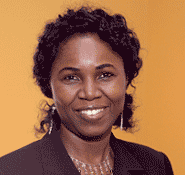As part of “Gender and the Law: Unintended Consequences, Unsettled Questions,” a March conference at the Radcliffe Institute for Advanced Study, Hauwa Ibrahim, a Nigerian attorney and Radcliffe Fellow, participated in a panel discussion on “Gendered Bodies, Legal Subjects.”[See full coverage of conference.] The following is based on a talk she gave at HLS in February.
Hauwa Ibrahim first came to international attention in 2003 when she won an appeal for Amina Lawal, a Nigerian woman convicted of adultery and sentenced to death by stoning under Sharia law. Ibrahim has now been involved with more than 150 such cases—using Sharia law to fight Sharia penalties.
A Radcliffe Fellow this year, she spoke to a Harvard Law School audience in February at the invitation of the Harvard African Law Association and HLS Advocates.
Nigeria is divided roughly between the Muslim-dominated north and the Christian-majority south. When civilian rule was restored in 1999, she explained, the new constitution guaranteed freedom of religion and separation of church and state, but the same year, a northern state adopted a Sharia penal code, and 11 others have since followed suit. The tension has been so thick, she said, “you can cut it with a knife. People just want to be at each other’s throats.”
A Muslim, and one of the few women lawyers practicing in her native northern Nigeria, Ibrahim had been a prosecutor for eight years when, in 1999, she was invited by an NGO to put together an appeal in the first case brought under the new law. An unmarried girl who became pregnant was sentenced to 100 lashes (increased to 180 because there was deemed insufficient evidence against the men she said had raped her). Ibrahim went on to develop a pro bono practice defending those most vulnerable under the law: women and children who are poor and often illiterate, “powerless and voiceless.”
But even when representing clients, Ibrahim herself hasn’t always had a voice in Sharia court. Recalling her first appearance, she said: “I stood up to introduce myself. The judge looked around, and in my team are two men, and he says, ‘Hauwa, there are men in the court.’” Ibrahim tried to continue, but the judge stopped her: “Hauwa, there aremen in the court.”
She quickly realized her standing as a lawyer was not as important as helping her clients. After that, she often arranged for a male attorney to read her statements to the court. She noted that since then, in at least one court, she has been allowed to address the bench and lead the defense. “Five years after the first encounter,” she said, “there is an opening for us to start speaking.“
When it came to representing Amina Lawal, Ibrahim put together a small team of lawyers as well as a group of Islamic scholars from the University of Cairo. They made the case that the Sharia penal code established certain procedures that had not been followed and that there were facts that had not been proven. Eventually the highest Sharia court in Katsina State dismissed the charges against Lawal, establishing precedent for future cases.
Ibrahim pointed out that she and her colleagues took the case to the Sharia court of appeals, even though they knew that under the Nigerian constitution, the court didn’t have jurisdiction over criminal matters. “But we had no option. It was either life or death,” she said. “We chose life.”
Ibrahim has received awards for her work—including the European Parliament’s 2005 Sakharov Prize for Freedom of Thought—but she also received death threats and accusations that she is being paid by the West to destroy Islam. (She is adamant about not accepting funding for her work.) “Some of what we are trying to do, we may not achieve in our lifetime,” she said. “But it doesn’t hurt to start digging the foundation.”
